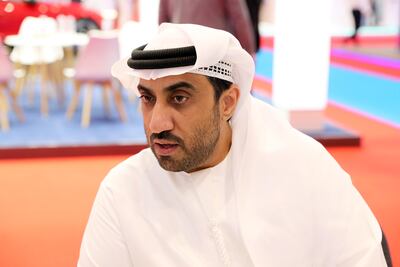UAE cable marker Ducab is bullish about growth in 2022 as global economies continue to recover from the coronavirus pandemic and countries in the region boost spending on infrastructure projects due to higher oil prices.
The company, which is jointly owned by Abu Dhabi holding company ADQ and the Investment Corporation of Dubai, recorded a 35 per cent jump in its revenue last year on the back of higher exports and growing sales in the region, its chief executive Mohammed Al Mutawa said.
“We are quite positive about growth this year and look to grow year-on-year,” Mr Al Mutawa told The National on Monday on the sidelines of the Middle East Energy event in Dubai.
“We are looking for a much closer and deeper partnership with our clients. Looking at how can we add value besides supplying cable … looking at how we can provide holistic service to our clients.”
Last year, Ducab exported its products, which include cables and metal, to different countries in Europe, North and South America as well as India, Australia and the GCC region. It aims to boost its exports further this year as economies recover from the pandemic.
“We are continuing our focus on export markets,” Mr Al Mutawa said.
Although Ducab's existing markets will continue to be the company's focus area, it sees “biggest potential in African and European markets”, he said.
“The African market is a growing market for us, the European market … there is a supply opportunity for Ducab with a versatile product offering and versatile solution.”
Ducab has “great potential for playing a bigger role in the international market”, Mr Al Mutawa said.
He is also bullish about opportunities in the UAE as well as other economies in the Gulf region as countries increase spending on infrastructure projects as oil prices rise and ease Covid-19-related movement restrictions amid lower case numbers.
Oil prices soared above $130 a barrel in early trading on Monday, their highest since 2008.
The jump occurred after the US said it is considering banning the import of Russian crude and that it is discussing such a move with its European allies in a bid to freeze the world's second-largest energy exporter out of global markets and isolate Moscow economically for its military offensive in Ukraine.
“We are located in an area where oil makes a big impact on the economy,” Mr Al Mutawa said.
“With oil prices reaching this [level], there will be more expenditure from oil and gas sector, there will be expansion and [new] infrastructure projects are coming up.”

The UAE, the Arab world’s second-largest economy, is building a rail network connecting 11 cities through Etihad Rail. The project is expected to carry 36.5 million passengers a year by 2030.
Saudi Arabia, the Arab world’s largest economy, is also spending heavily on a number of projects including a $500 billion futuristic city called Neom and new tourism projects across the country. The kingdom also plans to build more internal railway networks to jump-start its investment in the infrastructure sector.
“We are playing a very big role in supplying a lot of cable to Etihad Rail,” Mr Al Mutawa said.
Ducab is also supplying its products to energy projects in the region including Al Dhafra solar plant in Abu Dhabi, Mohammed bin Rashid Al Maktoum Solar Park in Dubai, Barakah nuclear plant as well as Sudair solar plant in Saudi Arabia.
The company was also awarded a major contract in Iraq last year as Opec's second-largest oil producer focuses on boosting its power supply.
Ducab's total production of cables and metal reached 170,000 tonnes last year.


